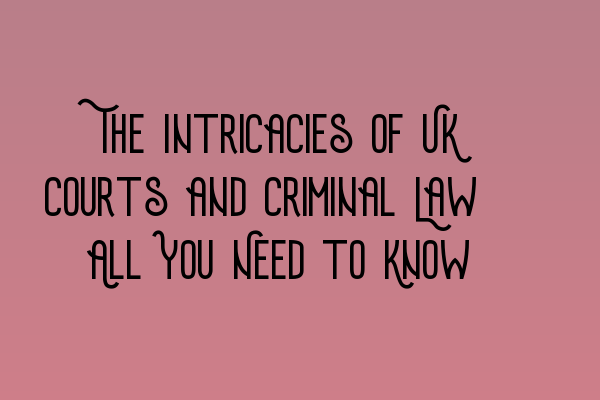The Intricacies of UK Courts and Criminal Law: All You Need to Know
Introduction:
Navigating the UK legal system can be a daunting task, especially when it comes to courts and criminal law. Whether you’re directly involved in a criminal case or just looking to expand your knowledge, understanding the intricacies of UK courts and criminal law is essential. In this comprehensive guide, we will take you through the key aspects of the system, from the different types of courts to the criminal law process, enabling you to grasp the essentials while delving into the fascinating world of criminal justice.
Types of Courts:
1. Magistrates’ Courts:
Magistrates’ Courts are the starting point for most criminal cases in the UK. These courts deal with less serious offenses, such as petty theft or minor assaults. Magistrates, who are usually volunteers, oversee these proceedings. With their extensive knowledge of criminal law, they listen to evidence, consider pleas, and hand down verdicts.
2. Crown Courts:
Crown Courts handle more serious criminal offenses and cases that have been passed up from Magistrates’ Courts. They are presided over by a judge, and a jury of 12 individuals is responsible for determining guilt or innocence. Crown Courts are often the stage for high-profile trials, making them an intriguing part of the UK legal system.
3. High Court:
The High Court deals with criminal cases that require a higher level of expertise and consideration. This court is divided into three divisions: the Queen’s Bench Division, the Chancery Division, and the Family Division. High Court judges handle complex cases such as murder trials or cases involving significant public interest.
The Criminal Law Process:
1. Investigation:
The criminal law process begins with an investigation. Law enforcement agencies gather evidence, interview witnesses, and build a case against potential suspects. This crucial stage sets the foundation for the legal proceedings that follow.
2. Arrest and Questioning:
If there is sufficient evidence to suggest that a crime has been committed, the police can arrest the suspect. Upon arrest, the suspect has the right to remain silent and seek legal representation. The police may question suspects to gather further information about the alleged crime.
3. Charging Decision:
Once the investigation is complete, the prosecution makes a charging decision. They review the evidence and decide whether there is enough to proceed with a formal charge. If a charge is issued, the case moves forward to the courts.
4. Bail:
Upon being charged, the suspect may be granted bail or remanded in custody, depending on the seriousness of the offense and the likelihood of the suspect fleeing or interfering with the case. Bail conditions can be imposed to ensure the suspect’s compliance while awaiting trial.
5. Court Proceedings:
The court proceedings begin with the first appearance, known as the preliminary hearing. During this stage, the defendant enters a plea of guilty or not guilty. If a not guilty plea is entered, the case moves to trial, where evidence is presented by both the prosecution and the defense.
6. Verdict and Sentencing:
Once the evidence is presented, the jury (in Crown Court cases) or the magistrates (in Magistrates’ Court cases) deliberates and delivers a verdict. If found guilty, the judge issues a sentence, taking into account factors such as the severity of the crime, the defendant’s criminal history, and any mitigating circumstances.
Conclusion:
Understanding the intricacies of UK courts and criminal law is essential for anyone involved in the legal system or seeking knowledge about criminal justice. From the different types of courts to the criminal law process, this guide has provided you with a comprehensive overview. While there is much more to explore within the realm of criminal law, this guide serves as a strong foundation to build upon. Armed with this knowledge, you can now navigate the complexities of the UK legal system with confidence.
